Ethiopia's big plans to boost tourist numbers
- Published
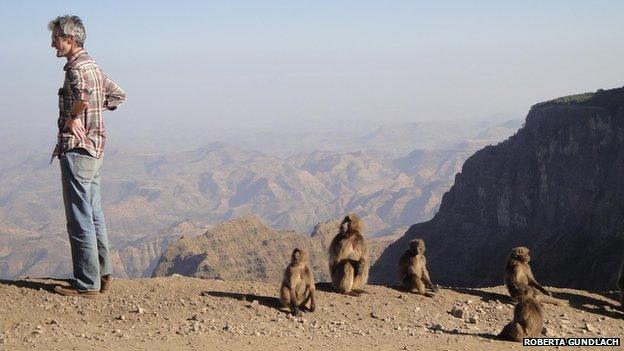
A group of gelada monkeys keep a close eye on reporter James Jeffrey in Ethiopia's Simien Mountains
Perched at 3,260m (10,696 ft) above sea level, the Simien Lodge is the highest hotel in Africa.
It was built in 2007 by a British entrepreneur who had an eye for a dramatic view and was not put off by the challenge of building in Ethiopia's rugged and isolated Simien Mountains.
The man in question, Nick Crane, first came to Ethiopia to help during its 1974 drought.
Now the 62-year-old is at the forefront of promoting a positive side to this unique and still misunderstood country.
When not in Ethiopia, Mr Crane spends much of his time visiting travel companies across Europe to highlight the nation's scenery and wildlife, and rich cultural and historic sites.
"Previously some tour operators would not touch Ethiopia with a barge pole," he says. "But now that is changing."
Untapped potential
Ethiopia's tourism industry has long lagged behind other African nations.
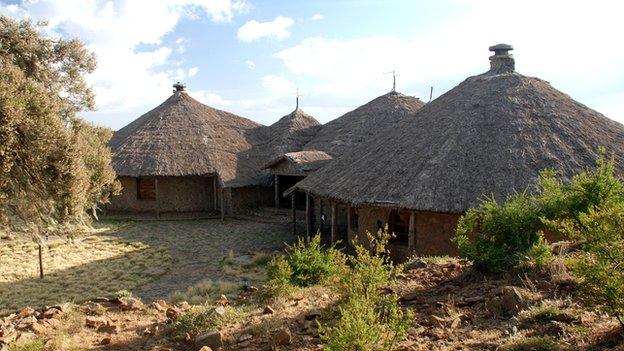
The Simien Lodge hotel is modelled on traditional Ethiopian huts
Recent comparable data showed that Africa's most popular destinations - Morocco and South Africa - got 9.3 million and 8.3 million overseas visitors respectively in 2011.
Ethiopia by contrast received just 523,000, putting it in 17th place across the continent.
But visitor numbers to Ethiopia are now growing by 10% each year, according to the Ethiopian Ministry of Culture and Tourism.
It adds the income the country's tourism sector receives is growing by 20% per annum, as the tourists who do visit are spending more.
Greg Dorey, the UK's ambassador to Ethiopia, says the nation's tourism potential "is certainly huge" and the Ethiopian government has expressed its intention to make the country one of the best visitor destinations in Africa.
There is even talk in Ethiopia of how tourism's contribution to the nation's foreign currency earnings could eventually overtake coffee, which has long been number one.
Yet to boost tourism numbers, Mr Dorey says Ethiopia has to increase investment.
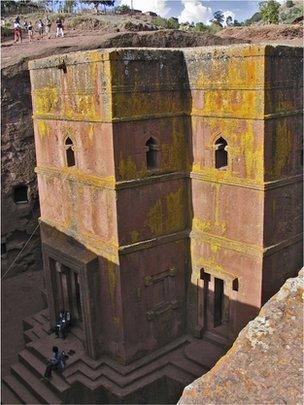
Ethiopia has nine world heritage sites
Continuing to build infrastructure that meets the expectations of foreigners is key to maintaining this trend "as there is a limit to how much people are willing to rough it", Mr Dorey says.
At Mr Crane's Simien Lodge, while the exterior of the building was designed to look like a group of traditional Ethiopian huts, the interior is clean and modern.
This helps attract wealthier tourists, and he wants other hoteliers to follow his example.
Across the whole of the Simien Mountains National Park Mr Crane says that the number of annual tourists has increased from 5,000 in 2007 to 24,000 last year.
He adds that a high proportion of the newer visitors are Americans and Europeans aged over 50, people who have - and are happy to spend - money.
These members of the so-called baby boomer generation typically spend about $2,500 (£1,600) per person while on holiday in Ethiopia, significantly more than the young backpackers the country has traditionally attracted.
Transformative role
Yet other than Simien Lodge there are currently only two other hotels inside Ethiopia's 15 national parks.
One of these two facilities, in the Bale Mountains National Park, was opened this year by another British entrepreneur.
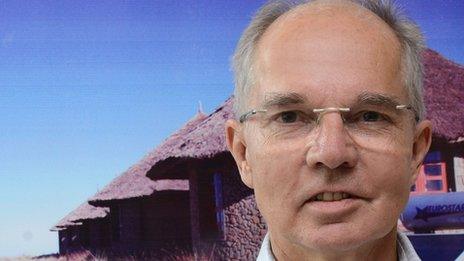
Nick Crane works hard to promote tourism in Ethiopia
This might lead one to ask whether the Ethiopian government should be taking the lead here rather than enterprising British expats.
Yet Mr Dorey says: "[Ethiopia's] Prime Minister Hailemariam Desalegn is gripping the situation by chairing a high-level committee to tackle the country's tourism [shortfall]."
At the same time, however, the ambassador notes that many in government who lack international exposure still don't appreciate the potentially transformative economic role of tourism, and the contribution it could make to alleviating poverty.
Finding a balance
Ethiopia, like many other developing nations, is also not immune to the temptation of charging overseas visitors more for the same service.
Even dishevelled, fiscally-minded backpackers have had to endure basic local hotels charging one rate for Ethiopians and a higher rate for faranj - foreigners.
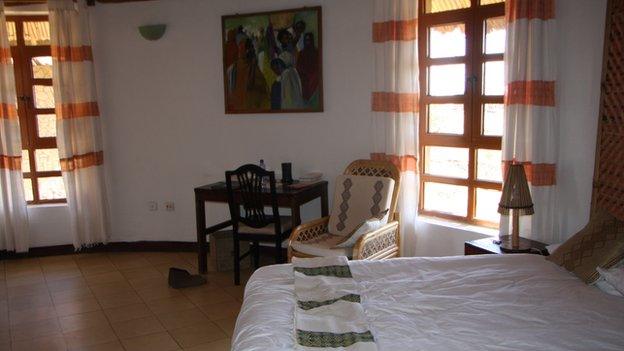
The Simien Lodge has been designed to appeal to Western tourists
And a current serious gripe among foreigners coming to Ethiopia for short-term work is how Ethiopian Airlines, at the end of 2013, raised the cost of internal flights for non-resident foreigners.
Others have noted entrance fees soaring at historical sites such as the rock-hewn churches of Lalibela.
There is also the question, some note, of what exactly is being done with the increasing flow of tourist dollars entering the country.
In the Simien Mountains National Park, for example, one must endure a taxingly bumpy ride to the lodge along the only crude road that threads through the park.
At the same time, the park's rudimentary facilities and camp sites have not changed for years.
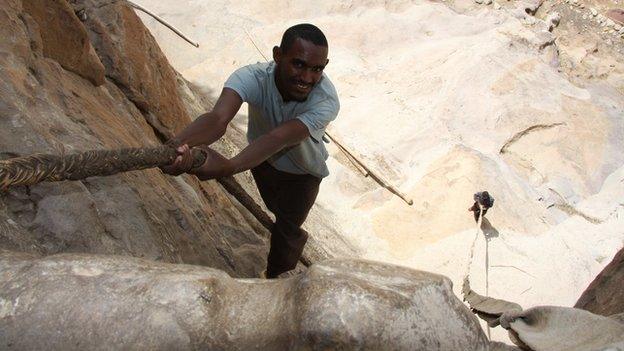
Some of Ethiopia's tourist attractions, such as the monastery of Debre Damo, require a head for heights
Nevertheless, more tourists are coming to the Simien Mountains, and to Ethiopia in general, including "those with business interests, and who could themselves become investors in Ethiopia if their experiences are positive", Mr Dorey points out.
Such reactions and word of mouth may have much to do with fanning continued interest and growth, while Ethiopia's tourism infrastructure and publicity machine catch up.
Roberta Gundlach, an American 57-year-old mother of three, spent two nights at Simien Lodge before travelling on with her two friends to the city of Axum further north.
Since childhood she always wanted to visit Africa, but life and marriage got in the way, says Ms Gundlach. Then last year one of her travelling friends returned from his first trip to Ethiopia.
"He told me I simply had to go to Ethiopia," Ms Gundlach says.
Many in Ethiopia will be hoping the word continues to spread.